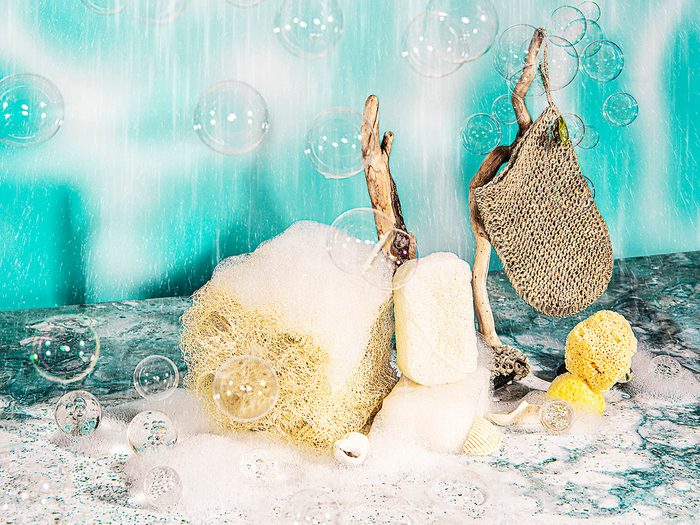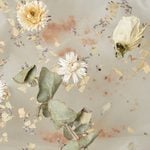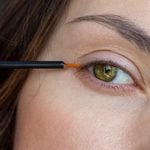Why You Should Dump Your Plastic Loofah for an All-Natural Alternative

Plant-based and compostable bath sponges, scrubbers and loofahs not only get you clean but they’re great for the Earth too.
From sea sponges and Japanese konjac roots to woven hemp mitts and dried loofah squashes, the number of natural sponge and scrubber options can be overwhelming. But making the switch from synthetic to organic for this shower staple is well worth the time.
Synthetic scrubbers, sponges and loofahs are made of plastics like nylon and polyurethane. They shed tiny bits of plastic, known as microplastics, every time you use them—contributing to the billions of pieces already in our lakes, rivers and oceans. One 2019 study from the Scripps Institute of Oceanography estimates there are 8.3 million pieces of microplastics per cubic metre of water. In another recent study from the University of Toronto’s Rochman Lab, researchers sampled thousands of fish from the Great Lakes and found microplastics in all of their gastrointestinal tracks—up to 900 plastic particles per fish, suggesting that exposure may be above threshold concentrations for risk. One way to help reduce microplastics in our waterways is to switch to a natural body washing tool.
Not only do they pose environmental risk, but plastic loofahs (also called poufs) may also present a health hazard from bacteria buildup. “A loofah sponge can act as a reservoir for the transmission of pathogenic bacteria,” says Dr. Michal Bohdanowicz, a dermatologist at Bay Dermatology Centre in Toronto. Using a loofah daily results in skin cell buildup in the folds of the material. Combine that with the moist environment of the bathroom, and a loofah is the ideal bacterial breeding ground.
(Related: 11 Important Single-Use Plastic Swaps to Make Now)
While pondering what might live in your loofah, it’s important to think about what your scrubber is made of. According to Bohdanowicz, “The materials within a loofah sponge do matter from a medical perspective.” For example, the friction caused by scrubbing your skin with something too rough might worsen existing skin issues, like eczema and hyperpigmentation, Bohdanowicz says. So even eco-alternatives like a dried loofah squash or hemp mitt might be too harsh.
It’s also a good idea to test out new products on a small patch of skin before charging ahead. “Different materials and contaminants within a loofah can be associated with contact dermatitis,” says Bohdanowicz, who suggests trying any new product on an area smaller than the size of the palm (and ideally hidden by clothing) for two weeks.
With all that in mind, I tried out the silk sea sponge from Toronto-based Wildcraft for my face and the Everist konjac root sponge for my body. Both start off hard and soften as they soak up water. Sea sponges contain natural minerals like iron, zinc and potassium, which are said to help nourish your skin, and the konjac sponge’s material creates a rich lather no matter which body wash I used. I found them each gentle enough for daily use. For weekly exfoliating, I tested the hemp mitt from Body Shop and the plant-based Éco & Éco Loofah (a loofah is a type of squash that, when dried, creates a sponge so natural that seeds fell out onto my shower floor the first time I used it). Both are pretty rough, so I didn’t apply a lot of pressure. They also don’t lather very well, so when I exfoliated I also did a quick pass with the konjac sponge. Overall, I would skip the natural loofah as a body scrubber (but it works great as a dish sponge). I would definitely continue to use the hemp mitt as an exfoliator.
They all pass the environmental test, but they’re unfortunately not bacteria-proof. As with synthetic products, rinsing thoroughly and hanging them to dry after every use is a must. After using the super soft and squishy konjac sponge, I had to squeeze it out multiple times and hang it in a different room to be sure it dried completely. The natural loofah and hemp mitt have large pockets of space for air to get in, so they dried within a few hours. The natural enzymes in the sea sponge actually help block bacteria growth, and it also dried within a couple of hours.
Once a week, give your loofah or sponge a deeper clean by soaking it for five minutes in diluted bleach or vinegar, or in a solution of baking soda and water, then let it dry completely. Check the care instructions for your product. Most importantly, know when it’s time to toss it. If it smells funky or is discoloured, give it the big heave-ho. And don’t feel too bad—natural products will break down and return to the earth.
Get scrubbing with these options:
Éco & Éco Loofah
This all-natural loofah from Montréal-based Éco & Éco is as plant-based as you can get. Made from a dried loofah squash, this sponge alternative is coarse when dry but wonderfully squishy when wet. $7, thegreenjarshop.com.
Everist Compostable Konjac Body Sponge
From Canadian brand Everist, this Konjac root sponge turns into a fluffy, sudsy cloud when damp. Bonus: It’s fully compostable. $14, helloeverist.com.
Body Shop Hemp Mitt
Made from 100 percent hemp fibres, this little mitt is the perfect environmentally friendly exfoliator to rub away dead skin in the shower. $12, bodyshop.com.
Wildcraft Silk Sea Sponge
These sustainably harvested seas sponges have enzymes that make them naturally bacteria- and smell-resistant. Their soft texture also gently exfoliates the skin. $12, wildcraftcare.com.
Next: The Best Sustainable Beauty Tools For Every Step of Your Routine




